Real-time Audio/Video Collaboration Tool
Tools that support audio and video will provide a more reliable experience if video is disabled or only used when needed (e.g. for the speaker).
UNBC Enterprise licenses for Zoom now manage information inside Canada. Ensure you are signed into your UNBC Zoom account when using chat features and recording meetings if you are discussing any information about an identifiable individual or business sensitive matters. Any chat logs or recordings created that contain personal information will be stored outside of Canada if you do not use your enterprise Zoom account. Even though the management of our enterprise Zoom accounts’ data now occurs within Canada, you still need to follow proper protocols when you are recording other people on Zoom or any other external platform. Contact privacy@unbc.ca if you need more information about standard recording protocols.
Zoom Account Creation:
Zoom is now a Single Sign On application at UNBC.
Anyone with a UNBC account can now sign in to Zoom using their UNBC credentials.
- If you already have a Zoom account (with a unique password), this will log you in to that same account
- If you do not already have a Zoom account, it will provision one for you automatically with a Basic license
- If you require more than a Basic license please contact support@unbc.ca
- Employees are encouraged to install and use the Zoom Plugin for Microsoft Outlook to send meeting invites to other UNBC folks
Already have an Account and want to use SSO?
Sign In Steps
- Visit the UNBC Zoom site
- Sign in with your UNBC account credentials to use the application and configure your account
- Join an existing meeting using a link
- Host a meeting by signing in
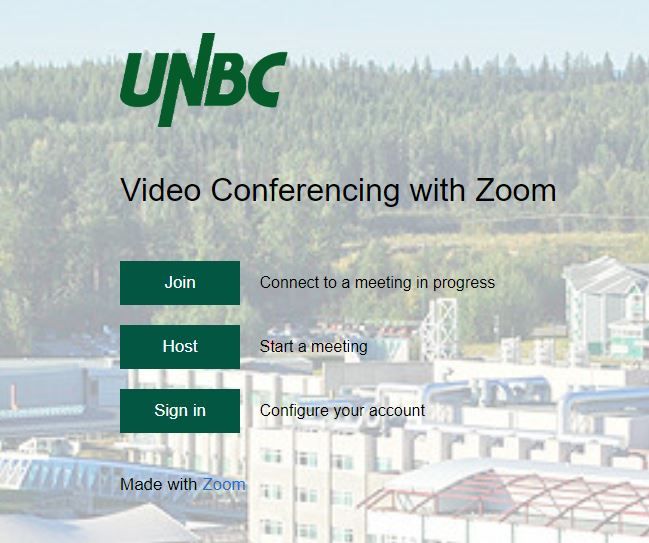
Single Sign On - use your UNBC account credentials
- Checkbox - Clear prior granting of permission for release of your information to this service - this checkbox will remove any previously set permissions and allow you to reset.
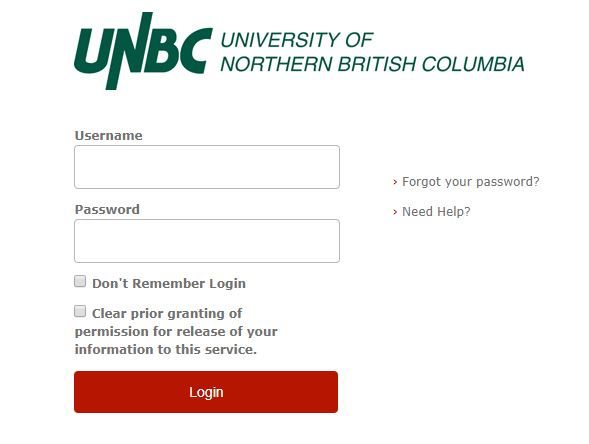
Terms of Use at UNBC
- Accept or Refuse as appropriate
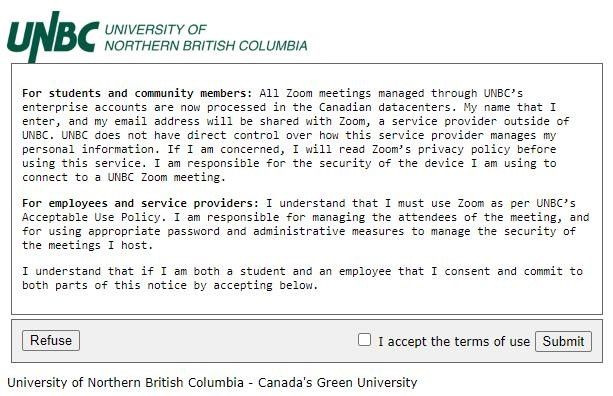
Responses required for Information Release
- Choose your option and click Accept to continue.
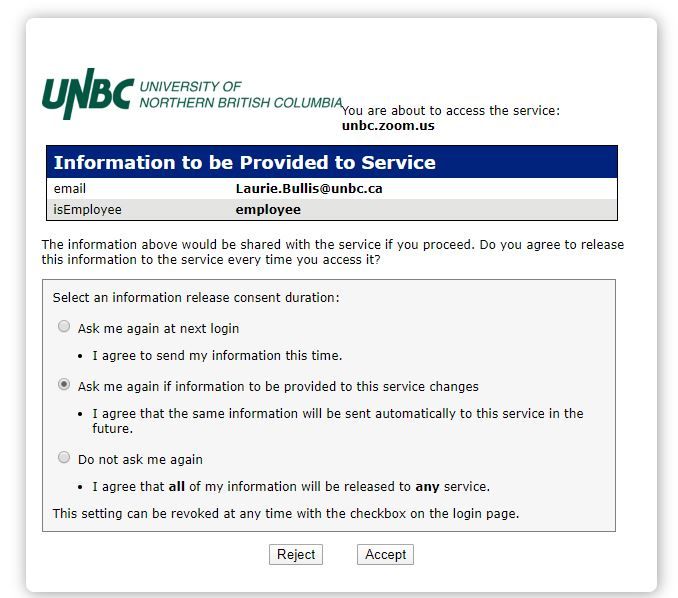
- Choose reject to exit Zoom.
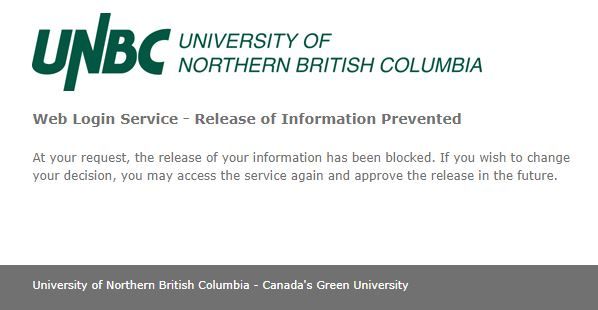
Recommendations
One-to-one or less than four participants:
- Zoom: Video conferencing.
- Apple iPhone smartphones: phone, FaceTime Video, iMessage instant messaging.
- Apple iPad tablets: FaceTime Video, iMessage instant messaging.
More than four participants:
- Zoom: Video conferencing.
- TELUS Audio Conferencing: If you already have a TELUS audio conference bridge, use it when possible.
Zoom Training Resources and Best Practices
Tools optimized for teaching online including questions regarding Collaborate and Learn:
- please contact the CTLT at ctlt@unbc.ca or visit the CTLT webpages
Videoconferencing and Privacy Considerations
When utilizing videoconferencing services for teaching, learning and administrative work at UNBC, there are privacy considerations that need to be taken into account. UNBC does not have control over the security of these services nor can we fully understand the information management practices these services employ. What faculty and staff can do to support the privacy rights of the university community includes being informed about the services you are asking others to use, and being prepared to be accountable for ensuring that the community you are working with has the opportunity to provide informed consent when necessary before you are requiring them to use videoconferencing software, or any other service that operates outside of UNBC.
As a baseline, assume videoconferencing services manage information similar to social media services unless you have a contractual commitment from the service provider stating otherwise. When considering how you want to use videoconferencing services, ask yourself if the personal information you are asking others to put into videoconferencing services would be appropriate to find on social media before you ask them to do it. Some individuals are more comfortable disclosing their personal information than others. The choice to manage personal information in videoconferencing services that wouldn’t be typically found on the average person’s social media posts needs to be accompanied by written informed consent to demonstrate we have considered, respected, and educated our community on the risk to their privacy. Reviewing and discussing the privacy practices of these services provides a learning opportunity for everyone in the university community.
Every employee of the university has the same responsibility to ensure that we comply with the Freedom of Information and Protection of Privacy Act. You have support managing that responsibility. You may contact itsecurity@unbc.ca to ask for support assessing whether the service utilizes adequate security measures to protect personal information. You may also contact privacy@unbc.ca to ask for help making informed choices regarding the appropriate scope for the use of a service, gather informed consent from your participants, and recommend the questions to ask your service provider about how it manages personal and business information.